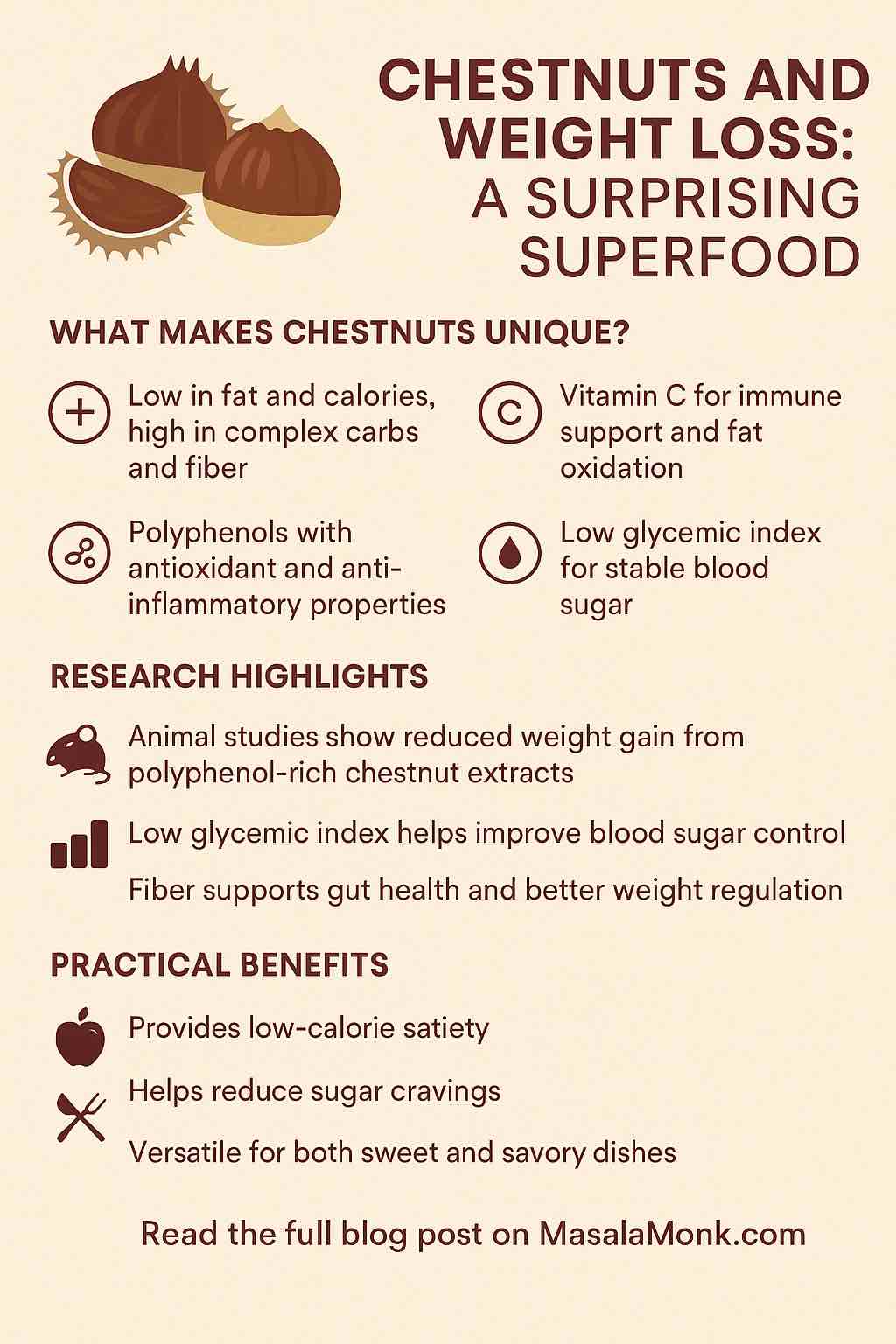
When we think about nuts and weight loss, almonds, walnuts, or pistachios usually come to mind. But there’s a lesser-known contender in the nut world that’s gaining recognition for its unique nutritional properties and potential to aid weight management: the chestnut. Unlike other nuts that are high in fat and calories, chestnuts stand apart with their low fat content, high fiber, and a composition more similar to whole grains than typical nuts. This blog explores how chestnuts can be a delicious and effective part of your weight loss journey, backed by recent scientific research and practical tips.
What Makes Chestnuts Unique?
Unlike almonds or cashews, chestnuts are low in fat (about 2g per 100g) and calories (~245 kcal per 100g roasted), but rich in complex carbohydrates and dietary fiber. They also offer:
- Vitamin C: Uncommon in nuts, vital for immune support and fat oxidation.
- Manganese and Copper: Support metabolism and enzymatic functions.
- Polyphenols: Especially gallic and ellagic acid, which have antioxidant and anti-inflammatory properties.
- Low Glycemic Index: Slow-digesting carbs that stabilize blood sugar and reduce cravings.
This combination makes chestnuts nutritionally closer to sweet potatoes or whole grains than to other nuts.
The Science: Chestnuts and Weight Management
Emerging research from 2022 to 2024 has deepened our understanding of chestnuts’ effects on metabolism:
- Animal Studies: A 2024 mouse study showed that polyphenol-rich chestnut shell extract significantly reduced weight gain and fat accumulation in high-fat diet-fed mice. The mechanism? Modulating the JAK2/STAT3 signaling pathway to improve leptin sensitivity and reduce appetite.
- Glycemic Control: Studies have shown that chestnut flour and starch, especially when treated with enzymes or enriched with polyphenols, have a lower glycemic index. This contributes to better blood sugar control, which is key for reducing insulin resistance and hunger spikes.
- Digestive Health: The fiber in chestnuts not only improves bowel movements but also promotes a healthy gut microbiome, which is increasingly linked to better weight regulation.
- Micronutrient Synergy: Vitamin C, along with manganese and B vitamins in chestnuts, supports energy metabolism, particularly fat oxidation.
How Chestnuts Support Weight Loss in Practical Terms
- Low-Calorie Satiety: Chestnuts provide a feeling of fullness without packing on calories, making them ideal for snacks or meal additions.
- Craving Control: The complex carbs and fiber slow digestion and reduce the likelihood of sugar cravings.
- Versatility: Use them roasted, boiled, or as flour in baking. They can replace more calorie-dense ingredients in both sweet and savory recipes.
- Meal Ideas:
- Add roasted chestnuts to salads for a sweet, starchy element.
- Use chestnut flour in pancakes or muffins.
- Blend cooked chestnuts into soups or purees for creamy texture without dairy.
- Better Than Many Snacks:SnackCalories (100g)Fat (g)Fiber (g)GIChestnuts~2452.2~5LowAlmonds~58050~12LowPotato Chips~54035~4HighDates~2770.2~8High
Important Considerations
While chestnuts are nutritious, some points to keep in mind:
- High in Carbs: Not ideal for very low-carb or ketogenic diets.
- Preparation Required: Raw chestnuts need to be cooked before eating.
- Seasonal: Fresh chestnuts are typically available in fall and winter, but vacuum-packed or frozen options are available year-round.
Conclusion: Are Chestnuts Right for Your Weight Loss Plan?
If you’re looking for a low-fat, fiber-rich, and satisfying food to help you manage weight, chestnuts are an excellent addition to your diet. They provide a unique set of nutrients that support satiety, regulate blood sugar, and promote metabolic health. Though they might not be as protein-dense as almonds or walnuts, their low caloric load and high fiber content make them a smart snack or cooking ingredient.
Try incorporating chestnuts in your weekly meals and discover how this underappreciated nut can help you eat well, feel full, and move closer to your health goals.
Frequently Asked Questions (FAQs)
1. Are chestnuts good for weight loss?
Yes. Chestnuts are low in fat and calories, high in fiber, and have a low glycemic index, all of which help promote satiety, stabilize blood sugar, and reduce overeating.
2. How many chestnuts should I eat per day for weight management?
A serving of 5–7 roasted chestnuts (about 85–100g) provides around 200–250 calories. This is a balanced portion for snacking or as part of a meal.
3. Are chestnuts keto-friendly?
No. Chestnuts are high in carbohydrates and are not suitable for ketogenic or very low-carb diets. They are more appropriate for balanced or moderate-carb meal plans.
4. Do chestnuts spike blood sugar?
Chestnuts have a low glycemic index (~54) and are digested slowly, making them a better choice than refined carbs for blood sugar control.
5. Are chestnuts better than almonds or walnuts for weight loss?
Chestnuts are lower in fat and calories than most nuts, making them ideal for volume-based eating and calorie control. However, they contain less protein and healthy fat than almonds or walnuts, so they serve different roles nutritionally.
6. Can chestnuts help reduce belly fat?
Indirectly, yes. Studies on chestnut polyphenols (especially in the shells) show reduced fat accumulation and improved leptin sensitivity in animals. While human studies are pending, their fiber and low-calorie profile support better fat regulation.
7. Are cooked chestnuts more nutritious than raw?
Chestnuts must be cooked to be digestible. Cooking slightly reduces vitamin C but enhances digestibility and preserves most of the beneficial compounds.
8. How can I incorporate chestnuts into my diet?
Try them roasted as a snack, blended into soups, chopped into salads, or used as flour in gluten-free baking like pancakes, breads, or muffins.
9. Can I eat chestnuts year-round?
Yes. While fresh chestnuts are seasonal (fall/winter), vacuum-packed, frozen, or canned chestnuts are widely available year-round and retain most nutrients.
10. Are there any side effects of eating chestnuts?
Chestnuts are generally well-tolerated. However, consuming large amounts may cause bloating due to their fiber. Also, people with tree nut allergies should check with a healthcare provider before adding them.









